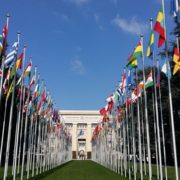The Philippines on Thursday, July 11 rejected a United Nations resolution that mandates a “comprehensive” international review of the drug war that has been ongoing since President Rodrigo Duterte took office three years ago.
The United Nations Human Rights Council’s (UNHRC) resolution seeks an investigation into the rising death toll, which has been disputed, ranging from 6,600 individuals according to the Philippine National Police (PNP) to around 27,000 based to human rights groups’ estimates.
The text, initially proposed by Iceland, calls on United Nations High Commissioner for Human Rights Michelle Bachelet to prepare a “comprehensive written report on the situation of human rights in the Philippines,” over the coming year.
The measure received the backing of 18 states in the 47-member rights council, with 14 nations voting against and 15 abstentions.
Leila Matar, deputy director for Human Rights Watch in Geneva, hailed the resolution as “a modest but vital” step that “signals the start of accountability for thousands of ‘drug war’-related killings.”
Amnesty International, meanwhile, called Thursday’s vote “crucial.”
“[It] provides hope for thousands of bereaved families in the Philippines and countless more Filipinos bravely challenging the Duterte administration’s murderous ‘war on drugs,’” said Amnesty’s regional director for east and southeast Asia, Nicholas Bequelin, in a statement.
However, the vote was immediately rejected by Philippine ambassador to the UN in Geneva, Evan Garcia. It is a “tiny, minority-approved” measure that “insulted” the Philippines, he said.
“We will not accept a politically partisan and one-sided resolution,” the ambassador added. “This resolution does not represent a triumph of human rights but a travesty of them.”
Philippine Foreign Secretary Teodoro Locsin Jr. released a statement on the Department of Foreign Affairs website wherein he rejected the result as well, calling it “a politically partisan and one-sided resolution.”
He added, “The Philippines renews its solemn responsibility to protect the law-abiding against the lawless by any means efficient to achieve the defining purpose for the existence and expense of a state. To that responsibility, my President has made an iron, unwavering and total commitment; and it will not be weakened by this ill-fated resolution.”
Locsin also said that the adoption of the resolution has “no effect as such resolutions, especially those passed by a tiny minority, can and will be ignored.”
“By a tiny minority, rejections and abstentions vastly outnumbered it,” he said.
Presidential spokesperson Salvador Panelo said the resolution “reeks of nauseating politics completely devoid of respect for the sovereignty of our country, even as it is bereft of the gruesome realities of the drug menace.”
Duterte told reporters in Manila on Thursday that he would “review” the report once ready.
“Should it proceed impartially, we are certain that its result will only lead to the humiliation of the investigators, as well as of Iceland and the 17 other nations supporting it, since there never have been — nor will there ever be — state-sponsored killings in this part of the world,” Panelo said.





